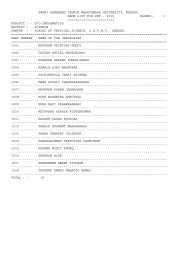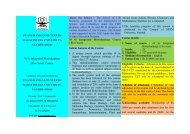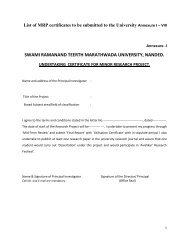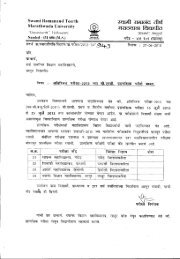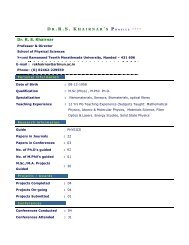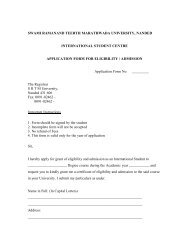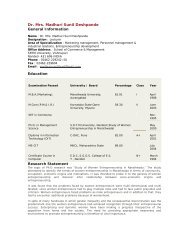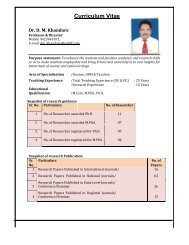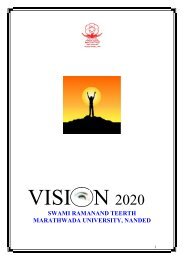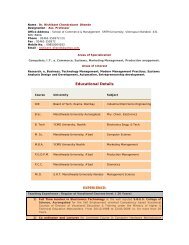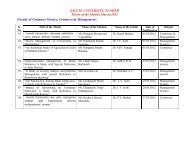MA - The Swami Ramanand Teerth Marathwada University
MA - The Swami Ramanand Teerth Marathwada University
MA - The Swami Ramanand Teerth Marathwada University
You also want an ePaper? Increase the reach of your titles
YUMPU automatically turns print PDFs into web optimized ePapers that Google loves.
SWAMI RA<strong>MA</strong>NAND TEERTH <strong>MA</strong>RATHWADA<br />
UNIVERSITY, NANDED<br />
STRUCTURE AND SYLLABUS<br />
For award of degree<br />
Master of Arts in Education<br />
Introduced from Academic year 2009 onwards<br />
And<br />
Subject to revise from time to time<br />
JULY -2009<br />
1
Contents:<br />
1. <strong>The</strong> General Objectives Of M.A. ( Education) Course Are :<br />
2. Duration of the Course<br />
3. Eligibility For Admission<br />
4. Structure of the M.A. ( Education)<br />
5. Attendance<br />
6. Scheme of Examination<br />
7. <strong>The</strong> Examination For <strong>The</strong> Degree Of M.A. (Education) Course<br />
Shall Be By Papers, Practicals, Seminar, Project, Field Based<br />
Experience, Dissertation And Viva-Voce<br />
8. Standard of Passing<br />
9. Conversion of Marks Into Grade -Point, Letter- Grade And Class<br />
10. <strong>The</strong> Marks Certificate<br />
11. (Improvement Of Class)<br />
12. Repeater Rules<br />
13. Detail Syllabus<br />
a. Semester I<br />
b. Semester II<br />
c. Semester III<br />
d. Semester IV<br />
Introduction:<br />
2
<strong>Swami</strong> <strong>Ramanand</strong> <strong>Teerth</strong> <strong>Marathwada</strong> <strong>University</strong>, Nanded is introducing<br />
a new post graduate course Master of Arts (Education) in the Faculty of<br />
Education from academic year 2009. This course is equivalent to M.Ed.<br />
program that already being run in the jurisdiction. M. A. Education will<br />
have good prospectus in teacher Education institutions and other<br />
Educational organizations. Course structure and syllabus for this is<br />
formed with following objectives.<br />
<strong>The</strong> General Objectives of M.A.(Education) Course are as<br />
1. To prepare professional personnel required for staffing of the<br />
Colleges of Education.<br />
2. To prepare administrators and supervisors for schools and for<br />
positions of responsibilities in the Education Department at<br />
Institutions engaged in Educational Research and Educational<br />
planning.<br />
3. To prepare personnel for various educational services.<br />
4. To enable to understand, analyse, evaluate Philosophical, Social,<br />
Economic, Cultural, Psychological concern of Education.<br />
Duration of the Course<br />
<strong>The</strong> course for the Master of Arts (M.A.-Education) Regular,<br />
semester Pattern shall be of two academic year having four<br />
semesters. <strong>The</strong> Terms and vacations of the course shall be as<br />
prescribed by the <strong>University</strong> from time to time.<br />
Eligibility for Admissions:<br />
a. A candidate, who has passed the B.Ed., Examination of this<br />
<strong>University</strong> or any other <strong>University</strong> recognized as equivalent there<br />
to shall be eligible for admission to the course, provided he/she has<br />
secured at least 50% of the marks in the theory part. In the case of<br />
SC/ST students this percentage of marks shall be at least 45%.<br />
3
. Provisional admission of candidates shall be given based on the<br />
criteria and the guidelines issued by the university in this respect<br />
from time to time.<br />
c. <strong>The</strong> reservations will be given as per the policy and guidelines<br />
Medium:<br />
prescribed by <strong>University</strong> and government, subject to revision by<br />
the university from time to time.<br />
a. Medium of Instruction: - <strong>The</strong> medium of instruction for this course<br />
will be Marathi or English. Concerned<br />
department can make arrangement and is<br />
permitted to do so by the <strong>University</strong>.<br />
b. Medium of Dissertation: - <strong>The</strong> students, with preceding permission,<br />
have option of medium for the submission of<br />
the dissertation as - Marathi or English.<br />
irrespective of the medium of Instruction, but<br />
not different from the medium of the<br />
Examination.<br />
c. Medium of Examination:-<strong>The</strong> medium of the Examination shall be<br />
Attendance<br />
Marathi or English.<br />
a. A candidate desiring to appear for the M.A. (Education)<br />
examination must attend the College recognized for this<br />
purpose.<br />
b. In each semester in each paper/practical/ activities/seminar a<br />
student should put-in at least a minimum 75% attendance,<br />
subject to the general provisions existing in the <strong>University</strong><br />
for condonation of attendance, provided a student who falls<br />
short of the required minimum of attendance in the first or<br />
4
second semester shall make good the same in the next year I<br />
semester and II semester term as the case may be.<br />
c. Student shall attend the lectures and undertake activities<br />
(Components under each Head) of the course in each<br />
semester as prescribed by the <strong>University</strong>.<br />
d. In case a student remains absent for a particular component<br />
Course Structure:<br />
he/she will have to make good the same in subsequent year.<br />
<strong>The</strong> course is structured by following heads:<br />
Semester wise details of course are as-<br />
Semester I:<br />
<strong>The</strong>ory Title Marks<br />
Papers<br />
Internal External<br />
<strong>MA</strong>E-01 Philosophical & Sociological 20 80<br />
Foundations of Education<br />
<strong>MA</strong>E-02 Psychological Foundation of Education 20 80<br />
<strong>MA</strong>E-03 Methodology in Educational Research 20 80<br />
<strong>MA</strong>E-04<br />
Semester II<br />
Teacher Education 20 80<br />
<strong>The</strong>ory Title Marks<br />
Papers<br />
Internal External<br />
<strong>MA</strong>E-05 Philosophical & Sociological 20 80<br />
Foundations of Education<br />
<strong>MA</strong>E-06 Psychological Foundation of Education 20 80<br />
<strong>MA</strong>E-07 Methodology in Educational Research 20 80<br />
<strong>MA</strong>E-08<br />
Semester III<br />
Teacher Education 20 80<br />
<strong>The</strong>ory Title Marks<br />
Papers<br />
Internal External<br />
<strong>MA</strong>E-09 Educational<br />
Management<br />
Administration & 20 80<br />
<strong>MA</strong>E-10 Education Technology 20 80<br />
<strong>MA</strong>E-11 Elective related to School subject 20 80<br />
Pedagogy<br />
<strong>MA</strong>E-12 Practicum & Field study 100<br />
Total 400<br />
Note: From three elective related to school subject pedagogy papers one should<br />
be selected related to paper no. <strong>MA</strong>E-11 for semester third.<br />
Head<br />
<strong>MA</strong>E-12 Practical & Field Study Marks<br />
5
1 Practise teaching observation ( minimum 5 lessons)<br />
Extension/ Community work related to Health,<br />
nutrition, cleanliness, literacy and other educational<br />
20<br />
2 issues 15<br />
3 Internship at Teacher Education Institutions ( 3 days) 30<br />
4 Seminar on Comprehensive issues<br />
Paper presentation at state/ National level ( minimum<br />
15<br />
5 1 during the period of course) 20<br />
Total 100<br />
Semester IV<br />
<strong>The</strong>ory Title Marks<br />
Papers<br />
Internal External<br />
<strong>MA</strong>E-13 Educational Measurement & Evaluation 20 80<br />
<strong>MA</strong>E-14 Special Education 20 80<br />
<strong>MA</strong>E-15 Elective Group A (Candidate has to opt<br />
any one )<br />
20 80<br />
<strong>MA</strong>E-16 Elective Group B (Candidate has to opt<br />
any one )<br />
20 80<br />
Dissertation and viva-voce 100<br />
Total<br />
Note:<br />
500<br />
1. From elective group A one paper should be selected for paper no. <strong>MA</strong>E-<br />
15 and elective group B one paper should be selected for paper no <strong>MA</strong>E-<br />
16 for semester fourth.<br />
2. Dissertation topic will be decided through discussion with teachers of<br />
concerned colleges and they have to take care of avoiding repetition of<br />
topic or plagiarism.<br />
Scheme of Examination<br />
<strong>The</strong> examination for the degree of M.A. (Education) course shall be both<br />
Grand Total:<br />
Semester I (400) + Semester II (400) + Semester III (400) + Semester IV (500) = 1700<br />
External & Internal modes. External exam will be arranged by <strong>University</strong>.<br />
Internal assessment is to be followed by own mechanism of school.<br />
External referee for viva voce will be appointed by <strong>University</strong>.<br />
Standard of passing:<br />
Standard of passing will be as per rules of university applicable to all PG<br />
of the concern faculty.<br />
Improvement of class:<br />
Persons who hold Second class at the M.A. Education & who appear for<br />
the same examination in the same subjects in order to improve their class<br />
6
to secure higher Second Class shall be allowed to do so as per the<br />
provisions of the following rules :-<br />
1. <strong>The</strong> concession to re-appear will be available only to the holders of the<br />
Master's degree of this <strong>University</strong>.<br />
2. Persons holding M.A. Education degree of this <strong>University</strong> in the<br />
second class & desirous of reappearing for the same examination for<br />
improvement of class shall be given three chances to do so within a<br />
period of six years from his/her first passing the said examination in the<br />
second class.<br />
3. <strong>The</strong> students who reappear for examination for improvement of class<br />
will be required to appear for a minimum of 2 theory papers at a time.<br />
A candidate passing any of the post-graduate examination above under<br />
these rules shall be not eligible to receive any prize, scholarship etc.<br />
instituted by the <strong>University</strong> & he/she shall also not be entitled to a merit<br />
certificate from the <strong>University</strong>. If a candidate is unable to get a higher<br />
class under this scheme, his/her previous performance in the<br />
corresponding examination shall hold good.<br />
SEMESTER I<br />
PHILOSOPHICAL AND SOCIOLOGICAL FOUNDATIONS OF<br />
EDUCATION<br />
___________________________________________________________<br />
Objectives of Paper:<br />
1. To enable the student to understand the philosophical and<br />
sociological origins of education.<br />
2. Logical analysis, interpretation and synthesis of various concepts,<br />
proposition and Philosophical assumptions about educational<br />
phenomena.<br />
7
3. To help the student to develop a philosophical and sociological<br />
outlook towards educational problems.<br />
4. Critical appraisal of contributions made to education by prominent<br />
educational thinkers<br />
___________________________________________________________<br />
Content of Paper:<br />
UNIT I: INTRODUCTION TO PHILOSOPHY OF EDUCATIONAL.<br />
1. Philosophy – meaning, need, its Nature and functions.<br />
2. Philosophy of Education – meaning & scope<br />
3. Nature of Philosophy of Education: A directive Discipline, Liberal<br />
Discipline, An activity<br />
4. Functions of Philosophy of Education : Speculative, Analytic ,<br />
Normative<br />
5. Understanding Nature & Functions of Philosophy with respect to<br />
aspects : like Aims and Objectives, Methods of Teaching,<br />
Curriculum, Text Book, Teacher-Pupil Relationship, Discipline ,<br />
methods of evaluation<br />
UNIT 2: PERSPECTIVES OF PHILOSOPHY OF EDUCATION:<br />
1. Western Schools: Idealism, Realism, Naturalism, Pragmatism and<br />
Existentialism: concepts of knowledge, reality and values; their<br />
educational implications for aims, contents and methods of<br />
education.<br />
2. Indian Schools: Vedanta, Buddhism, Jainism and Islam: concepts of<br />
knowledge, reality and values; their educational implications for<br />
aims, contents and methods of education.<br />
UNIT 3: PHILOSOPHY OF EDUCATION AND DEVELOPMENT:<br />
8
Educational thoughts and practices made by great thinkers like<br />
Vivekananda, Tagore, Gandhi and SriAurobindo and critical<br />
appreciation of their contribution with reference to their views on –<br />
a) Concept of Man and his Development<br />
b) Socio-cultural scenario, a global perspective.<br />
UNIT 4: INTRODUCTION TO SOCIOLOGY OF EDUCATION:<br />
1. Relationship of Sociology and Education<br />
2. Meaning and nature of Educational sociology and Sociology of<br />
education<br />
3. Education-as social sub-system-specific characteristics.<br />
4. Social Process like Socialisation, Stratification, Social Change,<br />
social mobility; their meaning, nature, role, constraints and relation to<br />
education<br />
UNIT 5: EMERGING TRENDS IN SOCIETY AND EDUCATION<br />
Emerging trends in society, their meaning, nature, scope and impact on<br />
education regarding aims of education, curriculum, role of teacher,<br />
student teacher relations, Methods of teaching and Evaluation.<br />
Emerging Trends:<br />
1. Knowledge Society<br />
2. Education for Sustainable Development<br />
3. Liberalization<br />
4. Privatization<br />
5. Globalization<br />
6. Multicultural Society<br />
7. Open and Distance Education<br />
Practicum: (any one)<br />
1. Identifying the educational problems of socially deprived students and<br />
preparing and implementing a compensatory programme for them.<br />
9
2. Reflective writing, in about 1000 words, on educational thoughts of<br />
any one educationist not included in curriculum<br />
SEMESTER II<br />
UNIT I: FIELDS OF PHILOSOPHICAL INQUIRY<br />
1. Metaphysics and Education<br />
2. Epistemology and Education<br />
3. Axiology and Education<br />
Meaning, Nature , limitations , significance and impact on aspects of<br />
education like Aims and Objectives, Methods of Teaching,<br />
Curriculum, Text Book, Teacher-Pupil Relationship, Discipline ,<br />
methods of evaluation with reference to various Indian and western<br />
school.<br />
UNIT II : PHILOSOPHY OF EDUCATION AND EVELOPMENT:<br />
Educational thoughts and practices made by great thinkers like Plato,<br />
John Dewey, Kant and critical appreciation of their contribution with<br />
reference to their views on –<br />
a) Concept of Man and his Development<br />
b) Socio-cultural scenario, a global perspective.<br />
UNIT III: CURRENT CHALLENGES IN EDUCATION<br />
a. Women Empowerment through Education : Gender Disparities,<br />
Women empowerment – need & Role of Education<br />
b. Education in multicultural society.<br />
c. Parent Education: Meaning, need and scope, Parent-Teacher<br />
Associations & their functions, main features of Parent Education<br />
Programmes<br />
10
UNIT IV: IMPACT OF SOCIO – ECONOMIC – POLITICAL<br />
IDEOLOGIES AND EDUCATION<br />
a) Impact of Individualism<br />
b) Impact of Fascism<br />
c) Impact of communism<br />
d) Philosophy of Emerging Indian Society and Education: Meaning and<br />
Characteristics of Democracy, Socialism and Secularism and<br />
Role of Education with reference to them<br />
UNIT V: SOCIAL RELATES OF EDUCATION<br />
Education and Family<br />
Education and Schooling<br />
Education and Peer group<br />
Education and culture in general<br />
Education and religion, Caste, Gender, Class<br />
Education for Weaker Sections<br />
PRACTICUM (ANY ONE)<br />
1. Write your statement of Educational Philosophy in 5oo words<br />
2. Conduct a survey regarding educational issues of your locality<br />
References:<br />
Altekar, (1975). Education in Ancient India (7thEd.). Varanasi : Monohar<br />
Prakashan.<br />
Ambedkar ,B.R., (1956). Goutam Buddha and His Dhamma. Delhi :<br />
Government Press.<br />
Bhatia, B.D., (1970). <strong>The</strong>ory and Principles of Education (11th Ed). New<br />
Delhi : Doaba House.<br />
Bron., F. J., (1970). Educational Sociology. New Delhi : Prentice Hall,<br />
Inc.<br />
11
Brubacher, J.S., (1969). Modern Philosophies of Education. New York :<br />
Mc Graw Hill Co. Inc.<br />
Pandey, Sanjay (2004). Peace Education. New Delhi: NCERT.<br />
Perters, R. S., (1973). Authority, Responsibility & Education (3rd Ed).<br />
London : George, Allen & Unwin.<br />
Pratle, R. (1997). Ideology & Education. New Delhi : David Macky Co.<br />
Price, Monroe & Thomson, Mark (2003). Forging Peace, Bloomington in<br />
47404- 3797 : Indian <strong>University</strong> Press 60/ North Morton street.<br />
Rusk, R. P., (1929). Philosophical Basis of Education. London : Warnick<br />
<strong>University</strong> Press Ltd.<br />
Saiyaddin, K. G., (1948). Education for International Understanding.<br />
Bombay : Hind Kitab.<br />
Taj, Haseen ( 2005). current challenges in Education. Hyderabad<br />
:Neelkamal<br />
vdksGdj x +fo- laiknd ¼1994½ frljh vko`Rrh ^ xka/kh fopkj n+'kZZu*<br />
[kaM 1 rs 12<br />
iq.ks % i`Foh izzdk'ku<br />
cksdhy fo +ik +¼1967½ *f'k{k.kkps rRoKku* ¼nqqljh<br />
vko`Rrh½ iq.ks % fp='kkGk izsl<br />
csdj<br />
tkWuW- ,l- ¼1971½ *vk/kqqfud<br />
f'k{k.kkph rRoKku* vuqqqoknd<br />
vkdksGsdj x + +fo iq.ks % Jh<br />
fo/kk izzdk'ku<br />
] 'kfuokj isB +<br />
dqaMys ]e-a-a ck-¼2000½ *'kS{kf.kd rRoKku o 'kS{kf.kd lekt'kkL=* iq.ks egkjk"V fon;k<br />
izzdk'ku-+<br />
Hkkslys f'kokthjko ¼1984½ ^eqqfDrxkFkk<br />
egkekuokph *iw.wkZZ;ksxh<br />
Jh vjfoana% thou o<br />
rRoKku iq.ks % vuekssy<br />
izdk'ku-<br />
esgasasnGs<br />
]; Jh- lekt'kkL+=+ph ewwyrRos<br />
iq.ks esgasnasasG<br />
izzdk'ku+<br />
ukjk;.k isB +<br />
ikjlful u- jk- f'k{k.kkph rkfRod o lekt'kkL+=+=kh; Hkwwfedk*<br />
uwwru<br />
izdk'ku iq.ks & 30-<br />
fnf{kr Jhfuokl ¼1975½ ^Hkkjrh; rRoKku* ukxiwj lqqfopkj<br />
izzdk'ku<br />
eaMG<br />
tkss'kh<br />
xtkuu ¼1994½ ^Hkkjrh; rRoKkukpk c``gnbfrgkl* ¼[kaM 1 rs 6½ iq.ks ejkBh<br />
rRoKku egkdks'k eaMG-<br />
12
SEMESTER I<br />
PSYCHOLOGICAL FOUNDATIONS OF EDUCATION<br />
Objectives of Paper:<br />
1. To enable the student to understand concepts and principles of<br />
Educational Psychology as an applied science.<br />
2. To enable the leaner to understand implications of psychological<br />
theories for education.<br />
3. To acquaint the learner with the process of development and<br />
assessment of various abilities and traits<br />
Content:<br />
UNIT I : EDUCATIONAL PSYCHOLOGY AN INTRODUCTION<br />
• Educational Psychology : Concept, concerns and scope of educational<br />
psychology,<br />
contribution of psychology to education<br />
UNIT II : HU<strong>MA</strong>N DEVELOPMENT<br />
• Human Development : Concept, principles, sequential stages of<br />
development; factors influencing d<br />
evelopment and their relative role; general characteristics and problems of<br />
each stage.<br />
• <strong>The</strong>ories of Piaget and Bruner – major concepts and stages and<br />
implications for<br />
education. • Indian theory of Psychological Development.<br />
UNIT III : THEORIES OF LEARNING<br />
• Learning : Concept, kinds, levels of learning various view points on<br />
learning, Gagne’s conditions of learning; cognitive view point and<br />
information processing; issues related to learning. Educational<br />
implications of the view points on learning.<br />
UNIT IV : GROUP DYNAMICS<br />
• Group Dynamics: Group process, interpersonal relations, sociometry<br />
grouping, Social-Emotional climate of the classroom and influence of<br />
teacher characteristics.<br />
13
UNIT V : INDIVIDUAL DIFFERENCES<br />
• Individual Difference: Concept of intra and inter differences:<br />
a) Intelligence and cognitive abilities, identification fostering<br />
b) Creativity – Nature, Process, Identification, fostering and Guiding<br />
creative children.<br />
c) Interests, attitude and values<br />
d) Adjustment of teaching – learning process to suit individual<br />
differences – learning styles and teaching strategies.<br />
Practicum (any one)<br />
1. Preparing a lesson plan incorporating the various psychological<br />
principles<br />
2. Administering any one psychological test to 5 peers and writing a<br />
report.<br />
SEMESTER II<br />
UNIT I: THEORIES OF PERSONALITY<br />
• Personality: Concept, development, structure and dynamics of<br />
personality<br />
• <strong>The</strong>ories of Personality – Allport, Eysenck; Psychoanalytic approach of<br />
Freud, Erickson;<br />
Behavioural approach – Miller, Dollard and Bandura, Humanistic<br />
approach – Rogers, Maslow<br />
UNIT II: INDIAN PERSPECTIVES OF PERSONALITY<br />
: Vedic, Buddhist, Rabindernath Tagore Mahatma Gandhi,<br />
J.Krishnamurti and Sri Aurobindo<br />
UNIT III: MEASUREMENT OF PERSONALITY<br />
• Assessment of Personality – Techniques<br />
a) Personality inventories – rating scales<br />
b) Projective techniques : Rorchach, TAT<br />
UNIT IV : ADJUSTMENT AND MENTAL HEALTH<br />
• Adjustment and Mental Health<br />
a) Concept, mechanism of adjustment – defence; escape, withdrawal,<br />
compensatory.<br />
b) Introduction to common forms of neuroses, psychosis and somatic<br />
disorders<br />
14
c) Principles of mental hygiene – preventive, constructive, curative<br />
measures,<br />
d) Implications for education<br />
Practicum: (any one)<br />
References:<br />
1. Prepare two case studies regarding various factors of<br />
personality<br />
2. Organise a programme for mental health and report the<br />
outcomes<br />
Baron, Robert A, (2003). psychological (3rd ed). New Delhi, 110092 :<br />
Prentice Hall of India.<br />
Baron, Robert A, ( 2003). Social psychology (10th ed). New Delhi :<br />
Prentice Hall of India .<br />
Berk,Laura E, (2003). Child Development (6th ed). New Delhi : Prentice<br />
Hall of India<br />
Benjamin, W.B., (1985). Hand book of Human Intelligence:<strong>The</strong>ories,<br />
Measurement and Application John, London : Wiley of Sons Inc.<br />
Beveridge, WIB, (1980). Seeds of Creativity London : Heinemann<br />
Educational Book Ltd.<br />
Chauhan, S.S., (1983). Psychology of Adolescence. New Delhi: Allied<br />
Publication.<br />
Dandapani, S.,(2000). Textbook of Educational Psychology. New Delhi:<br />
Anmol Publications Pvt. Ltd., 434/4B, Ansari road, Daryaganj, 110092.<br />
Devas, R.P., Jaya N. (1984). A Text Book on Child Development.<br />
Bombay : McMillan India Ltd.<br />
Fisher, Ronald j. (1982). Social Psychology, An Applied Approach. New<br />
York : St. Martins Press.<br />
Hilgad, E.R. And Bower, G.H., (1977). <strong>The</strong>ories of Learning. New Delhi<br />
:Prentice Hall of India Ltd.<br />
Jangira, N.K., etal (1991). Functional Assessment Guide. New Delhi :<br />
NCERT.<br />
Kuppuswami, B. (1967). An Introduction to Social Psychology. Bombay<br />
: Asia Publishing House.<br />
Shriwasthav, Prakash G.N., (1987). Recent Trends in Educational<br />
Psychology. Agra: Psychological Research Cell.<br />
Educational Psychology (Contribution & Great Psychologist (2008), Dr Lahorkar<br />
B.R., Dr.Joshi D.B. Dr.Sadavarte U.K. Aditya Publication<br />
jk- jk- ckiV vkf.k Hkkos ¼1973½ *f'k{k.kkps ekul'kkL=kh; vf/k"Bku* iq.ks % Jh fo|k<br />
15
izdzdk'ku- +<br />
dqyqyd.khZ ds + fo + *'kS{kf.kd ekul'kkL=kiqq.ks<br />
% Jh fo|k izdzdk'ku- +<br />
[kjkr vk +ik +¼1974½ *izzxr<br />
'k{S{S kf.kd ekul'kkL=k* iq.q.k s % Jh fo|k izdzdk'ku- +<br />
txrki g +u+uk + ¼1990½ *'k{S{S kf.kd o izkzkzk;ksfsfsfxd ekul'kkL=k* iq.q.k s % Jh fo|k<br />
izdzdzdk'ku- +<br />
t;Lokt lhrkjke ¼1990½ *Hkkjrh; euksfsfoKku* uoh fnYyh %vk;Z cqqd<br />
Msiks<br />
t+xrki g-+ +uk ¼1990½ *v/;;u mRiRrh o v/;kiu* iq.ks % uwwru<br />
izzdk'ku<br />
nkaMssdj<br />
ok +uk + ¼1998½ *'kS{kf.kd o izkzk;ksfsfxd ekul'kkL= iq.ks % eks?ks izdk'ku +<br />
izKk ekul la'kksfsf/kdk ¼1992½ cqf}oSHko iq.ks Kkuicksfsf/kuh<br />
cksjkMs jk j a dqqeBssdj<br />
ess?kk<br />
o brj ¼1990½ *oSdkfld ekul'kkL=* iq.ks fo|kFkh Z x`g-<br />
Jh vjfoan ¼1969½ *;ksx leUo; ikSMspspjh* % Jh vjfoana lkslk;Vh<br />
SEMESTER I<br />
METHODOLOGY OF EDUCATIONAL RESEARCH<br />
Objectives of Paper:<br />
To enable the students to understand :<br />
1. <strong>The</strong> meaning of scientific method, scientific inquiry, Paradigm, theory<br />
and this implications for educational research.<br />
2. <strong>The</strong> characteristics of philosophical, psychological and sociological<br />
researches in education.<br />
3. <strong>The</strong> different strategies of educational research.<br />
4. <strong>The</strong> techniques of developing a research proposal.<br />
5. <strong>The</strong> meaning and techniques of sampling<br />
6. <strong>The</strong> various types of tools of data collection.<br />
Content:<br />
UNIT I : EDUCATIONAL RESEARCH: AN INTRODUCTION<br />
Nature of Research, knowledge and Inquiry.<br />
Scientific inquiry, scientific method, nature and sources of<br />
knowledge.<br />
Paradigm, theory, model and approach; positivist and nonpositivist<br />
(humanities)<br />
paradigms and their implications for educational research.<br />
UNIT II : FOUNDATIONS OF RESEARCH<br />
Philosophical, psychological and sociological orientation in<br />
educational research.<br />
Interdisciplinarity in educational research and its implications.<br />
16
UNIT III : METHODS OF EDUCATIONAL RESEARCH<br />
• Experimental; Normative Survey; Historical’ Case Study; Development;<br />
Ethnographic; Documentary-analysis .<br />
• Evaluative Research and Action Research<br />
UNIT IV : Developing a Research Proposal<br />
Problem and its sources; Selection and Definition of problem.<br />
Objectives – primary, secondary and concomitant<br />
Hypothesis – nature, definition, types, sources, characteristics of a<br />
good hypothesis; directional and non-directional hypothesis.<br />
UNIT V :TOOLS AND TECHNIQUES OF DATA COLLECTION<br />
Observation; Interview; Sociometric techniques.<br />
Questionnaire, Rating scales; Interview schedules Attitude scales<br />
etc.<br />
Reliability and validity of various tools and techniques.<br />
PRACTICUM (any one)<br />
• Development of a research proposal for MEd. Dissertation and its<br />
seminar– presentation.<br />
• Construction of one tool of data collection.<br />
SEMESTER II<br />
UNIT I : DATA ANALYSIS AND PRESENTATION<br />
Nature of educational data : Quantitative and Qualitative dara<br />
Qualitative data : its analysis with emphasis on content analysis;<br />
analysis of interviewbased data and observation based data.<br />
Quantitative data : Scales of measurement : nominal, ordinal,<br />
internal, Ratio.<br />
Organization and representation : Frequency distribution.<br />
Frequency polygon,<br />
Histogram, Ogive, Smoothed frequency curve.<br />
UNIT II: DISCRIPTIVE STATISTICS<br />
Concept, calculation and uses of : Measures of central tendencies,<br />
a) Measures of variability.<br />
b) Percentiles and Percentile Ranks.<br />
c) Correlations, Regression equations<br />
Properties and uses of normal distribution<br />
UNIT III INFERENTIAL STATISTICS<br />
17
Standard errors, confidence limits<br />
Hypothesis testing Difference between means, correlations, Cross<br />
breaks (Chi-square) ,ANOVAnal<br />
Application of statistical tests and their interpretation<br />
UNIT IV : VALIDITY OF FINDINGS<br />
Validity and Limitations of findings; factors influencing validity of<br />
research; internal vs. external validity; how to increase validity of<br />
research findings.<br />
UNIT V : RESEARCH REPORTING<br />
Research report: sections (Preliminary part, main body, reference<br />
section)<br />
Skills of writing research report:<br />
Evaluation of Research: Criteria and types and types of research.<br />
Practicum: (any one)<br />
1. Review of two published research papers; one quantitative and the<br />
other qualitative.<br />
2. Evaluation of an MEd or an M.Phil. Dissertation.<br />
References<br />
Agrawal, J. C. (1968). Educational Research. New Delhi : Arya Book<br />
Depot.<br />
Best, J. W. (1982). Research in Education. New Delhi : Prentice Hall of<br />
India Pvt. Ltd.<br />
Campbell, W.G. etal (1968). Form & Style in <strong>The</strong>sis. Boston : Writing<br />
Houshton Mifin Co.<br />
Coery, (1953). Action Research to Improve School Practices. New York :<br />
Teachers College, Columbia <strong>University</strong>.<br />
Garrertt, H. E., (1981). Statistics in Psychology & Education. Vakits<br />
Feffer & Simons Ltd.<br />
Guilford, J. P., (1950). Fundamental Statistics in Psychology &<br />
Education. McGraw Hill Book Com.<br />
Good & Scates. Methods of Research.<br />
Fox, D. J., <strong>The</strong> Research Process in Education. (Holt).<br />
Kual, Lokesh (1988). Methodology of Educational Research. New Delhi<br />
:Vikas Publishing House Pvt.<br />
Robert, M. W., Travers. An Introduction of Educational Research. New<br />
York : <strong>The</strong> McMillan Company.<br />
Sukhia, Mehrotra & Mehrotra (1970). Elements of Educational Research :<br />
Alied Publishers Ltd.<br />
18
Kerlenger, F. Fundamentals of Behavioural Research.<br />
Tuckman, Bruce W., (1978). Conducting Educational Research. New<br />
York: Harcourt Barce Javanovich Ing.<br />
eqqGs<br />
jk + 'k + o mekB s fo + rq + 1977 'kS{kf.kd l'kk/kukph ewyrRo s ukxiwjw % egkjk"V<br />
fo|kihB xzaFzk fufeZrh eaMG +<br />
ns'kikaMs izzdk'k<br />
vkf.k iaMhr cUlhfcgkjh 1995 'kS{kf.kd d`rh laa'ks/ku iq.ks % uwru<br />
f”k{k.kkrhy uoizorZus 20008] MkW- izeksn tks”kh]izk- egs”k dGykos] vkfnR; izdk”ku] uaknsM<br />
SEMESTER I<br />
Objectives of Paper:<br />
To enable the student to:<br />
TEACHER EDUCATION<br />
1. Understand the philosophical foundation of teacher education.<br />
2. Acquaint with aims, objectives, structure and curriculum of teacher<br />
education.<br />
3. Trace the development of teacher education in India & West.<br />
6. Understand the thinking process of a teacher.<br />
7. Become acquainted with managerial aspects of various Practicals in<br />
teacher education.<br />
Content:<br />
UNIT- I PHILOSOPHICAL FOUNDATION OF TEACHER<br />
EDUCATION<br />
a. Concept, Aims and General objectives of Teacher Education<br />
b. Objectives of Teacher Education at various Levels<br />
c. Schools of Philosophy, Psychology and their Implications for Teacher<br />
Education<br />
i) Behaviouristic ii) Humanistic iii) Constructivistic iv) System Approach<br />
e. Ethics of shaping another Person’s Behaviour<br />
UNIT- II DEVELOPMENT OF TEACHER EDUCATION<br />
19
a. History of Teacher Education in West and India: Qualitative and<br />
quantitative growth<br />
b. Reports of National Commissions on Education - (with reference to<br />
Teacher Education only)<br />
c. Reports of International Commissions on Education - (with<br />
reference to Teacher Education only)<br />
d. Agencies of Teacher Education, their functions and role with<br />
reference to NCTE, UGC, NAAC, NCERT, SCERT, <strong>University</strong><br />
Faculty of Education, Academic Staff Colleges, Open<br />
Universities.<br />
UNIT- III STRUCTURE AND CONTENT OF TEACHER<br />
EDUCATION<br />
a. Pre-service and In-service Teacher Education: Meaning, rationale,<br />
need.<br />
b. Structure and content of Pre-service and In-service Teacher<br />
Education at various levels.<br />
c. General Components: <strong>The</strong>ory, Practical activities, Laboratory<br />
experiences, Practice Teaching, Field Experiences and Internal<br />
assessment: Nature, need, interrelations , constraints and quality<br />
management<br />
UNIT- IV: PROCESS OF BECOMING A TEACHER<br />
a. Contexts of Becoming a Teacher –<br />
i) Personal Context ii) Teacher Educator’s Context<br />
iii) Client Context iv) Research Context<br />
b. Teacher Professionalism – Roles, Attitudes, Values, Job<br />
Satisfaction<br />
c. Role of Teacher Education in shaping the behavior<br />
d.<br />
20
e. of Teacher and Professionalizing a Teacher<br />
f. Role of In service Teacher Education in shaping the<br />
teachers behavior and professionalizing a teacher<br />
UNIT V: RESEARCHES IN TEACHER EDUCATION<br />
a. Fundamental and applied researches in Teacher Education in India<br />
and in other countries<br />
b. Areas of researches: Teaching Effectiveness, Criteria of<br />
admission, Modification of Teacher behaviour, School<br />
effectiveness, classroom processes, teacher competencies &<br />
Values.<br />
Practicum (any one)<br />
1. Prepare a tool for observation or measurement of any<br />
one field activity like practice teaching, internship etc.<br />
2. Critical analysis of curriculum of teacher education program<br />
at various level.<br />
Objectives of Paper:<br />
To enable the student to:<br />
SEMESTER II<br />
TEACHER EDUCATION<br />
1. Understand the philosophical foundation of teacher education.<br />
2. Acquaint with aims, objectives, structure and curriculum of teacher<br />
education.<br />
3. Trace the development of teacher education in India & West.<br />
6. Understand the thinking process of a teacher.<br />
7. Become acquainted with managerial aspects of various Practicals in<br />
teacher education.<br />
21
UNIT I TEACHER THOUGHT PROCESS<br />
a. Concept of Teaching & Learning<br />
b. Relationship among Learning, Teaching and Teacher Education<br />
c. 3 Ps in Teaching – Perception, Planning and Performance<br />
d. Principles of planning, guiding for planning and procedure of feed<br />
back<br />
e. Teacher Thought process and Decision making<br />
UNIT II: PRACTICE TEACHING IN TEACHER EDUCATION<br />
f. Demonstrations<br />
g. Experimentation<br />
h. Practice teaching and observations<br />
i. Significance and Supervision of Practice teaching<br />
j. Internship<br />
k. Relationship of College of Education with Co-operating Schools<br />
UNIT III : EVALUATION PROCEDURES IN TEACHER<br />
EDUCATION<br />
a. Internal Assessment<br />
b. Aspect of Internal Assessment<br />
c. Weightage for Internal assessment<br />
d. New techniques of Evaluation<br />
e. External Evaluation<br />
f. Practice Teaching – Final Lesson<br />
g. <strong>The</strong>ory papers<br />
UNIT IV: CURRENT PROBLEMS, FUTURE PRIORITIES<br />
c. Teacher Education in the context of 21 st century and Current<br />
issues in Teacher Education<br />
d. Preparing teachers for special schools and inclusive education<br />
e. Modification of teacher behaviour and teacher characteristics<br />
22
f. Technological, Managerial, Pedagogical Trends in Teacher<br />
Education.<br />
UNIT V : TEACHER EDUCATION AS A PROFESSION:<br />
g. Professional organizations for various levels of teacher-types and<br />
there role & functions<br />
h. Performance appraisal of teacher educator<br />
i. Code of conduct and ethics of teacher education profession.<br />
j. Faculty improvement programme for teacher Education.<br />
Practicum: (any one)<br />
1. Organise a work shop/ seminar on any theme related to teacher<br />
education<br />
2. Make a case study of a teacher education college<br />
References:<br />
Anderson, L.W. & etal. Ed. (1997). Internetinal Encyclopedia of<br />
Teaching & Training Education: Pergamon Press.<br />
Biddle, B. J. etal. (1997). Internatiel Handbook of Ds & Teaching Vol I +<br />
II. Boston : Kular Academic Publication.<br />
Borich, G.D. (1997). Appresal of Teaching : Concept & Process: Addison<br />
Weslery ublishing Co. Reading Massachusetts.<br />
Brown, G Microteaching (1975). A Programmer of Teaching Skills.<br />
London : Methuen & Co. Ltd.<br />
Buch, M. B.,(Ed.) (1971). First Survey of Research on Education. Baroda<br />
: SERD.<br />
Buch, M. B.,(Ed.) (1979). Second Survey of Research on Education.<br />
Baroda : SERD.<br />
SEMISTER III<br />
EDUCATIONAL <strong>MA</strong>NAGEMENT AND ADMINISTRATION<br />
23
Objectives of Paper:<br />
1. To help the students to understand the concepts, principles processes and<br />
techniques of management of education scientifically.<br />
2. To acquaint the students with some management skills required in the educational<br />
environment.<br />
3. To enable the students to apply the concepts, techniques and processes of<br />
management to the situations in education.<br />
4. To orient the students with the procedures of supervision and inspection and bring<br />
about improvement in the field of education.<br />
Content:<br />
Unit 1: Concept and Meaning of Educational Management<br />
1. Educational Management: Concept, Nature, importance<br />
2. Trends in management ( concept, Nature and importance)<br />
Human Resource Management<br />
Performance Appraisal<br />
Time Management<br />
Unit 2: Concept and Meaning of Educational Administration<br />
1. Development of Modern Concept of Educational Administration from 1900 to<br />
Present-day.<br />
2. Taylorism<br />
3. Administration as a process<br />
4. Administration as a bureaucracy<br />
5. Meeting the Psychological needs of employees, systems approach<br />
6. Administration such as (a) Decision making, (b) PERT,<br />
UNIT 3: Structural Framework of Educational Management in India<br />
1. Agencies of educational Management – U.G.C., NCERT, NIEPA, CABE,<br />
NCTE, IGNOU (Genesis, objectives, functions and role)<br />
24
2. Management of Schools : Role of headmaster in planning of school activities<br />
3. Staff development programmes<br />
4. Role of teachers in school management and administration<br />
UNIT4: Process of Management<br />
A. Planning<br />
B. Organization<br />
C. Leadership<br />
Meaning and Nature<br />
Approaches to Educational Planning<br />
Perspective Planning<br />
Institutional Planning<br />
Unit 5: Educational Supervision<br />
References:<br />
Concept of Organization, Organisation theory.<br />
Concept of Organizational structure<br />
Factors affecting organizational structure<br />
Meaning and Nature of Leadership<br />
<strong>The</strong>ories of Leadership<br />
Styles of Leadership<br />
measurements of Leadership<br />
Meaning and Nature<br />
Supervision as service activity<br />
Supervision as a process<br />
Supervision as functions<br />
Supervision as educational leadership<br />
Modern supervision<br />
Functions of supervision<br />
Planning the supervisory programme<br />
Organizing supervisory programme<br />
Implementing supervisory programme<br />
Alfonso. R.J, Firth, G.R., Neville, R.E (1977) Instructional Supervision, - A<br />
Behavioural System: Boston – Allyn and Bacan, Inc.<br />
Anthony, N.F. (1981) Management competencies and Incompetence’s Canada:<br />
Addison Wesley Publishing Company, Inc.<br />
Arnole, H.J and Feldman, D.C. (1988) Organizational Behaviour, New York:<br />
McGraw – Hill Book Company<br />
25
Burton, W.H. and Brueckner, L.J (1955) Supervision – A Social Process, U.S.A<br />
Appleton<br />
Century Crofts, Inc.<br />
Desai, D and Other (1970) School Management and Change, Baroda: M.S <strong>University</strong>.<br />
Drunker, F.B (1985) Management – Tasks, Responsibilities and Practices, New Delhi:<br />
Allied Publishers Pvt. Ltd.<br />
Eric, H. and McMohan, A. (eds) (1986) <strong>The</strong> Management of Schools, London: Kogan<br />
Page.<br />
Etziono, A. (1972) Modern Organisation, New Jersey: Prentice Hall Inc. Eye, G.G<br />
and Netser,<br />
L.A (1965) Supervision of Instruction – a Phase of Administration, New York: Harper<br />
and Row, Publisher.<br />
Flippo, E.B (1884) Personnel Management. New York: McGraw Hill, Inc.<br />
Hersey, P. and Blanchard, K.E (1978) Management of Organizational Behavior, New<br />
Delhi: Prentice Hall of India.<br />
Kast and Rosenweig (174) Organizational and Management Systems Approach,<br />
Tokyo : McGraw Hill.<br />
Khanna, S.S (2000) Organizational Behavior, New Delhi: Chand and Company<br />
Knezevich, S.J (1975) Administration of Public Education New York, : Mc Graw Hill<br />
Book co.<br />
McNaklkly, E. (1959) Elementary School Administration and Supervision, New York:<br />
American Book company.<br />
Objectives<br />
SEMISTER III<br />
EDUCATIONAL TECHNOLOGY<br />
1. To enable the students teacher to understand about the meaning,<br />
nature and scope and significance of E.T. and its important<br />
components in terms of Hardware and Software.<br />
2. To help the students teachers to distinguish between<br />
communication and instruction so that they can develop and design<br />
a sound instructional system.<br />
26
3. To acquaint students teachers with levels, strategies and models of<br />
teaching for future improvement.<br />
4. To enable the students teachers to understand about the importance<br />
of programmed instructions and researches in E.T.<br />
5. To acquaint the student teachers with emerging trends in ET along<br />
Content:<br />
with the resource<br />
UNIT-I: INTRODUCTION TO EDUCATIONAL TECHNOLOGY<br />
Meaning, Nature, Scope and Significance of E.T.<br />
Components of E.T.: Software & hardware.<br />
Educational Technology and Instructional technology.<br />
systems approach in educational technology and its<br />
characteristics<br />
UNIT II : COMMUNICATION AND INSTRUCTION:<br />
Communication and Instruction: <strong>The</strong>ory, concept, nature,<br />
process, components, types and barriers<br />
Classroom communication: ( Verbal- Nonverbal)<br />
Mass media approach in educational Technology.<br />
Designing instructional system<br />
Formulation of instructional objectives.<br />
Task analysis.<br />
Designing of instructional strategies such as lecture, team<br />
teaching discussion, seminar and tutorials.<br />
UNIT-III: TEACHING LEVEL, STRATEGIES AND MODELS:<br />
.<br />
Stages of teaching- pre-active, interactive and post-active<br />
Teaching at different levels-memory, understanding and<br />
reflective<br />
27
Modification of teaching behaviour : Microteaching,<br />
Flander’s Interaction Analysis, simulation.<br />
Models of Teaching: meaning, nature, functions and types<br />
(Psychological models and modern models of teaching.<br />
Teaching strategies: meaning, Nature, functions and types<br />
like lecturing, questioning , presentation etc.<br />
Modelities of Teaching-difference between teaching and<br />
instruction. conditioning and training<br />
UNIT-IV : APPLICATIONS OF EDUCATION TECHNOLOGY<br />
• Programmed instruction (linear/branching model) - Origin and types –<br />
linear and branching.<br />
• Development of the progarmmed instruction material<br />
• teaching machines<br />
• Computer Assisted Instruction<br />
• Researches in Educational Technology<br />
• Future priorities in Educational Technology<br />
UNIT V : TRENDS IN EDUCATION TECHNOLOGY<br />
• Educational technology in formal, non-formal and Informal Education,<br />
Distance Education, Open Learning Systems and Educational<br />
Technology.<br />
• Emerging trends in Educational Technology, Videotape, Radio-vision,<br />
Tele-conferencing, CCTV, CAI, INSAT – Problems of New<br />
Technologies.<br />
• Evaluation and Educational Technology.<br />
• Resource Centres for Educational Technology, CIET, UGG, IGNOU,<br />
NOS, State ET Cells, AVRC, EMRC, NIST etc. – their activity for the<br />
improvement of teaching learning.<br />
References<br />
Alexis, Leon & others (1999). Fundamentals of Information Technology.<br />
New Delhi: Vikas Publishing House Pvt. Ltd.<br />
Babola, Danial T. (1998). Microsoft World. New Delhi : Prentice Hall of<br />
India Pvt. Ltd.<br />
Basandra, Suresh K. (2001). Computers Today. New Delhi : Galgotia<br />
Publishers Pvt. Ltd.<br />
28
Bharihoke, Deepak (2000). Fundamental of Information Technology.<br />
New Delhi : Pentagon Press.<br />
Bloom, R. S., (1974). Taxonomy of Educational Objectives : New Delhi.<br />
Mckay co., Inc.<br />
Chauhan, S. S., (1983). Innovations in Teaching Leaving Process: New<br />
Delhi .Vikas Publishing House Pvt. Ltd..<br />
Das, B. C., (2000). Educational Technology: Cuttack. Kalyani<br />
Publications.<br />
Honcok, A, (1977). Planning for Educational Mass Media : New York.<br />
Lougman Group Ltd.<br />
Jain, Madhulika & others (2000). Information Technology Concepts.<br />
New Delhi : BPB Publications.<br />
Kovalchick, Anna and Dawson, Kara (2005). Encyclopedia of Education<br />
and Technology: New Delhi. Vol 1 and 2 Pantagon Press..<br />
Objectives:<br />
SEMESTER III<br />
SOCIAL SCIENCES EDUCATION (Elective)<br />
1. To enhance the learners’ understanding of new perspectives in Social<br />
Sciences education by developing a world view of the practices in the<br />
area.<br />
2. To acquaint the learner with the latest educational thinking about<br />
Social Sciences education.<br />
4. To develop the skills needed for the devising Social Sciences<br />
curriculum for schools and for developing support materials and literature<br />
for curriculum transaction.<br />
5. To develop the ability and skills for evaluating the range of outcomes<br />
in Social Sciences education.<br />
6. To use of research findings in Social Sciences education for improving<br />
practices related to Social Sciences education.<br />
Content:<br />
UNIT I : NATURE OF SOCIAL SCIENCES AND SOCIAL SCIENCES<br />
EDUCATION<br />
29
Meaning, Nature, Characteristics and Limitations of Social<br />
Sciences<br />
Philosophy of Social Sciences :<br />
Social Sciences Education: Concept, Need and Scope and aims<br />
Subjects studied under social sciences like Economics, Geography,<br />
Civics and History: their significance, nature and interrelations<br />
Interdisciplinary Nature of Social Sciences<br />
Psychological , Sociological foundations of Social sciences<br />
Education<br />
UNIT II: TEACHING OF SOCIAL SCIENCES<br />
Aims & Objectives of Social Sciences Education at Primary,<br />
Secondary and Higher Education level<br />
Pedagogical principles of Social Sciences teaching, Methods,<br />
models and strategies for teaching of General and Specific Social<br />
Sciences.<br />
Innovative Teaching Social Sciences: Brain Storming, Group<br />
Discussion & Panel Discussion, Project, models of Teaching, CAI,<br />
multimedia approach.<br />
UNIT III: SOCIAL SCIENCES: STRUCTURE, CURRICULUM AND<br />
EVALUATION<br />
Structure of General Social Sciences as a Subject of Study<br />
Curriculum & Text books of Social Sciences at School Level with<br />
reference to Content Cum Methodology<br />
Content Analysis and Content Enrichment of Social Sciences at<br />
School level<br />
Co curricular activities for value addition of Social Sciences<br />
Education<br />
30
Evaluation of Social Sciences learning related to cognitive,<br />
affective and psychomotor domain: tools and techniques<br />
UNIT IV : TEACHER EDUCATION FOR SOCIAL SCIENCES<br />
TEACHER<br />
Curriculum of Social Sciences Methodology in teacher<br />
education program at various level<br />
Practice teaching, lesson guidance and super vision of Social<br />
Sciences teaching<br />
Behaviour modification of student teacher as a Social<br />
Sciences teacher: Inculcation of skills, methods and attitude<br />
Qualities of Social Sciences teacher- cognitive, affective and<br />
Psychomotor<br />
UNIT V: RESEARCHES IN SOCIAL SCIENCES EDUCATION<br />
Research in Social Sciences Education: Need & Importance<br />
Researches related to Curriculum, Syllabus & Text Books,<br />
teaching –learning process, evaluation and teachers of Social<br />
Sciences at School Level<br />
Present status of evaluation of Social Sciences teaching.<br />
Institutions/Organisations Involved in Social Sciences Education &<br />
Research: NCERT, Tata Institute of Fundamental Research,<br />
<strong>University</strong> departments and NGOs.<br />
PRACTICALS: (any one)<br />
1. Planning a lesson using any one model of teaching.<br />
2. Preparation of 20 higher order questions on any one unit of Social<br />
Sciences at Upper Primary and Secondary level.<br />
3. Review of Minimum five Researches in Social Sciences Education.<br />
4. Visits to Institutes related to Social Sciences Education.<br />
SEMESTER III<br />
31
SCIENCE EDUCATION (Elective)<br />
___________________________________________________________<br />
Objectives:<br />
1. To enhance the learner's understanding of new perspectives in science<br />
education by<br />
developing a world view of the practices in the area.<br />
2. To acquaint the learner with the latest educational thinking about<br />
science education.<br />
3. To develop the professional skills needed for practicing modern<br />
education including the Scientific listing of behavioral objective, devising<br />
appropriate transactional methodologies and technologies for achieving<br />
the outcomes.<br />
4. To develop the skills needed for the devising science curriculum for<br />
schools and for<br />
developing support materials and literature for curriculum transaction.<br />
5. To develop the ability and skills for evaluating the range of outcomes<br />
in science education.<br />
6. To use of research findings in science education for improving<br />
practices related to science education.<br />
UNIT I NATURE OF SCIENCE AND SCIENCE EDUCATION<br />
Meaning, Nature, Characteristics and Limitations of Science<br />
Philosophy of Science : Positivistic and Non positivistic<br />
History of Science Revolution<br />
Major Scientific Principles evolved during the progress of Science<br />
Science Education: Concept, Need and Scope and aims<br />
Scientific Attitude And Science Literacy : meaning, nature,<br />
parameters and dimensions of Development : Personal, Social and<br />
National<br />
32
UNIT II: TEACHING OF SCIENCE<br />
Aims & Objectives of Science Education at Primary, Secondary<br />
and Higher<br />
Education level<br />
Pedagogical principles of science teaching, Methods, models and<br />
strategies for teaching of General and Specific Science.<br />
Innovative Teaching Science: Brain Storming, Group Discussion &<br />
Panel Discussion, Project, models of Teaching, CAI ,multimedia<br />
approach.<br />
Constructive Learning in Science: Knowledge Construction-<br />
Meaning & Importance<br />
UNIT III: SCIENCE: STRUCTURE, CURRICULUM AND<br />
EVALUATION<br />
Structure of General Science as a Subject of Study<br />
Interdisciplinary Nature of Science<br />
Curriculum & Text books of Science at School Level with<br />
reference to Content Cum Methodology<br />
Content Analysis and Content Enrichment of Science at School<br />
level<br />
Co curricular activities for value addition of Science Education<br />
Evaluation of Science learning related to cognitive, affective and<br />
psychomotor domain: tools and techniques<br />
UNIT IV : TEACHER EDUCATION FOR SCIENCE TEACHER<br />
Curriculum of Science Methodology in teacher education<br />
program at various level<br />
Practice teaching, lesson guidance and super vision of<br />
science teaching<br />
33
Behaviour modification of student teacher as a science<br />
teacher: Inculcation of skills, methods and attitude<br />
Qualities of Science teacher- cognitive, affective and<br />
Psychomotor<br />
UNIT V: RESEARCHES IN SCIENCE EDUCATION<br />
Research in Science Education: Need & Importance<br />
Researches related to Curriculum, Syllabus & Text Books,<br />
teaching –learning process, evaluation and teachers of Science at<br />
School Level<br />
Present status of evaluation of science teaching.<br />
Institutions/Organisations Involved in Science Education &<br />
Research: NCERT, Tata Institute of Fundamental Research,<br />
Marathi Vidynyan Parishad, Centre for Environmental Education<br />
PRACTICALS: (any one)<br />
REFERENCES:<br />
1. Planning a lesson using any one model of teaching.<br />
2. Preparation of 20 higher order questions on any one unit of<br />
Science at Upper Primary and Secondary level.<br />
3. Review of Minimum five Researches in Science Education.<br />
4. Visits to Institutes related to Science Education.<br />
Abruscato Joseph (1982) Teaching Children Science Prentice Hall New<br />
Jersy<br />
Aumller, Mary Frances (1972). Teaching High school Chemistry .New<br />
York : Parker Publishing Company.<br />
Belson A.G.& Creaser H (1965) : Techniques & Apparatus for Science<br />
Teacher .Nairobi: Oxford Univ. Press.<br />
Bhugra K.L Dasgupta R.N. & Gupta J.P. (1977) Exploring Science Book<br />
I.II& III<br />
34
Cohel David (1997) New Trends in Integrated Science Teaching:<br />
Evaluation of Integrated Science Education (Vol I to IV) Delhi-55<br />
Jacobson ,Willard & Bergman Abby(1987) Science for Children. New<br />
Jersy Prentice Hall.<br />
Rao C. S. (1973) Science Teachers Handbook, Hyderabad,<br />
American peace Crops 10 Rao D.B.C (1997) : Leaving Science by stages<br />
(stage 1 to 7 ) New Delhi: Cambridge Publishing House.<br />
Sharma R.C. (1983). Modern Science Teaching, Dhanapat Rai and Sons,<br />
1682, NaiSarak, Delhi 110006.<br />
Summer W.L ( 1936) <strong>The</strong> Teaching of Science Oxford Basil Backwell.<br />
<strong>The</strong> Teaching of Science : A self Directed Planning Guide New York :<br />
Harper & Row Publishers.<br />
UNESCO(1971) New Trends in Integrated Science Teaching Paris :<br />
UNESCO Press.<br />
UNESCO(1973) New UNESCO Source Book Science Teaching Paris<br />
UNESCO Press .<br />
OBJECTIVES<br />
SEMESTER III<br />
LANGUAGE EDUCATION (Elective)<br />
1. To develop an understanding of the nature functions and implications for planning<br />
and teaching language.<br />
2. To acquaint the students to the traditions of Language education.<br />
3. To acquaint the students with pedagogy of language learning and teaching.<br />
4. To develop understanding and skill in differentiating between Teaching language<br />
and teaching literature in the context of L 1 and L2.<br />
5. To help the students to know various problems such as contextual, curriculum,<br />
teacher preparation etc. of language education in India.<br />
Content:<br />
UNIT I: NATURE, CHARACTERISTICS AND SOCIAL CONTEXT OF<br />
LANGUAGE<br />
35
a. Nature and characteristics of language<br />
b. Use of Language<br />
c. Social Context of Language<br />
d. Saussure and Yekaboson’s views about language<br />
UNIT: II INDIAN AND WESTERN TRADITIONS IN LANGUAGE<br />
a. Indian Traditions: Yask, Panini, Patanjali, Bhartihari<br />
b. Western Tradition: Behaviouristic Approach, Cognitive Approach, Communicative<br />
Approach<br />
UNIT: III: PSYCHOLOGY OF TEACHING AND LEARNING LANGUAGES.<br />
a. Psycholinguistic approach, principles of language<br />
b. Relation between the brain and language<br />
c. Psychology of language learning and language acquisition<br />
d. Factors affecting language learning and language acquisition<br />
UNIT IV: PEDAGOGY OF LANGUAGE TEACHING<br />
a. Developing the language curriculum and the syllabus, Need & Methods of teaching<br />
languages ( L1, L2, L3) in school curriculum.<br />
b. Innovative techniques for teaching grammar reading comprehension written<br />
expression, note-making, differential assignments, classroom tasks, personalized<br />
system of instruction, programmed learning and individualized i.e. need based reading<br />
and writing programmes<br />
c. Teaching of Literature: Story, Novel, Poetry, Personal Essay, Pen Portrait.<br />
Travelogue, Self Narration, Memories<br />
d. Teaching language for creativity<br />
UNIT V: RESEARCHES AND PROBLEMS OF LANGUAGE EDUCATION IN<br />
INDIA<br />
a. Multi lingual context of India<br />
b. Three –Language formula original as well as modified and its present status<br />
c. Policy Formulation and language Education levels: National Level, State level,<br />
District and Local level<br />
d. Researches done in India in the field of Teaching of language<br />
PRACTICUM (any one)<br />
1. Preparation of vocabulary test for L1/L2/L3 at Primary /Secondary level<br />
36
2 Survey the language Competency of school children /women /disadvantaged groups<br />
and writings its report.<br />
3. Visit to Language Laboratory and writing its report<br />
4. Preparation of two content enriched lesson –Plan by using various sources.<br />
REFERENCES:<br />
Corder S.P. Introducing Applied Linguistics, Penguin 1973 .<br />
Halliday Mclntosh and Strevens <strong>The</strong> Linguistic Sciences and Languages Teaching<br />
ELBS 1970<br />
Mackey W.F Language Teaching Analysis, Longmans 1966<br />
Lado R,Language Testing : <strong>The</strong> Construction and use of foreign language tests,<br />
London. Longmans 1961<br />
Gurry P.<strong>The</strong> Teaching of written English London Longmans 1954<br />
Narayanswami K.R. Reading comprehension at the College level CIEFL Monograph<br />
Bansal .R.K. and Harrison J.B. Spoken English for India Orient Longman Ltd. 1972.<br />
Turner J.D. Introduction to the Language Laboratory : <strong>University</strong> of London Press<br />
London.1965<br />
SEMISTER IV<br />
EDUCATIONAL MEASUREMENT AND EVALUATION<br />
Objectives: To enable the student to :<br />
1. Get acquainted with the basic concepts and practices adopted in educational<br />
measurement and educational evaluation<br />
2. Understand , manipulate and prepare the tools of measurement<br />
3. To understand measurement of educational and psychological aspects<br />
4. Get acquaint with various reforms in examination system<br />
Content of course:<br />
UNIT- I EDUCATIONAL MEASUREMENT AND EDUCATIONAL<br />
EVALUATION<br />
Meaning and concept of Educational Measurement<br />
Historical background of measurement<br />
Educational Evaluation - Concept, process, principles and types<br />
Relationship among measurement, assessment and evaluation<br />
Taxonomies of educational objectives.<br />
37
Objective as a base of teaching and measurement.<br />
UNIT-II: TOOLS OF MEASUREMENT AND EVALUATION<br />
Subjective and objective tools of measurement<br />
Nature, characteristics, advantages and limitations of the tests: essay tests,<br />
objective tests, and performance tests; Scales; Inventories; Questionnaires and<br />
Schedules<br />
Norm –referred and criterion referenced tests.<br />
Raw derived and standard scores Z score and T score<br />
UNIT- III CHARACTERISTICS OF A GOOD MEASURING<br />
INSTRUMENT<br />
Validity, Reliability, Objectivity, Adequacy, Usability, discriminating power,<br />
Norms<br />
Reliability - methods of establishing reliability, factors affecting, interpretation<br />
and improving reliability<br />
Validity - Types, Factors affecting, interpretation and improving validity<br />
Process of standardization of test: meaning, nature, steps and limitations.<br />
UNIT-IV MEASUREMENT OF E$DUCATIONAL AND PSYCHOLOGICAL<br />
ASPECTS<br />
Intelligence & creativity: Techniques, Needs, significance and limitations<br />
Personality : Techniques, Needs, significance and limitations<br />
Achievement, Interest, Attitude and Aptitude: Techniques, Needs, significance<br />
and limitations<br />
UNIT- V EXAMINATION REFORMS<br />
Meaning, nature, significance and limitations of following reforms<br />
Grading, Marking and Credit System<br />
Semester System<br />
Question Bank<br />
Continuous Internal Assessment<br />
Moderation and revaluation<br />
Online Examination<br />
Researches in Measurement & Evaluation : present status and future priorities.<br />
38
PRACTICALS<br />
1. Prepare a question bank of 25 questions at different levels and types for any<br />
one paper of B.Ed. or M.Ed. Course.<br />
2. Study of online examination system through visit to computer Institute.<br />
3. Measure attitude /interest /personality of five students at any level<br />
(School/B.Ed./M.Ed.)with the readymade test or inventory and interpret the<br />
results.<br />
4. Prepare administer and assess an achievement test for one Unit at B.Ed or<br />
M.Ed level and equivalence the results ( within the group and against a<br />
standard)<br />
References:<br />
Blood, Don and Budd, William, (1972). Educational Measurement and<br />
Evaluation. New York : Harper and Row Publishers.<br />
Chavan, C.P.S., (1993). Emerging Trends in Educational Evaluation. New Delhi :<br />
Common wealth Publishers.<br />
Choppin, Bruce and PasHethwaite, T. (1981). Evaluation in Education An<br />
International Review Series. New Delhi : Pergamon Press.<br />
Dandekar, W.N., and Rajguru, M.S., (1988). An Introduction to Psychological Testing<br />
and Statistics. Bombay : Sheth Publishers.<br />
Ebel, Robert and Frisible, David (2003). Essentials of Educational<br />
Measurements. New Delhi : Prentice Hall of India.<br />
Gramund, N.E., (1985). Measurement and Evaluation Teaching 5th Edition. New<br />
York : Machmillan Publishing Company.<br />
Harper, Edwin and Harper, Erika (2003). Preparing Objective Examinations : A<br />
Handbook for Teachers, Students, and Examiners, New Delhi : Prentice Hall of India.<br />
Martuza, Victor (1977). Applying Norm - Referenced and criterion - Referenced<br />
Measurement in Education. Boston : Ptllyn and Bacon Tnc.<br />
Mehrens, William and Lehmann,Irvin (1972). Measurement and Evaluation in<br />
Education and Psychology. New York : Holt, Rinehart.<br />
Objectives :<br />
SEMESTER-IV<br />
SPECIAL EDUCATION<br />
\<br />
39
To enable the students to:<br />
Understand the concept and nature of Special Education.<br />
Understand the modes an approaches of Special Education and<br />
approaches of Identification for Special children.<br />
Understand the meaning, characteristics, types, causes educational<br />
programmes, prevention and rehabilitation of various types of<br />
special children.<br />
Content<br />
UNIT I : Concept and nature of special education<br />
Objectives, types, historical perspective, integrated education<br />
UNIT II: Education of Mentally Retarded<br />
characteristics of the retarded<br />
educable mentally retarded<br />
teaching strategies<br />
enrichment programmes<br />
remedical programmes<br />
etiology and prevention<br />
mental hygiene as remediation<br />
UNIT III Education of the impaired & Handicapped<br />
Impairments: Visual and Hearing, characteristics, degree of<br />
impairment, etiology and prevention<br />
Orthopaedically Handicapped: types of handicap, characteristics<br />
Educational programmes for impaired and orthopaedically<br />
handicapped<br />
UNIT IV :Education of the Gifted , Creative and Disabled Children<br />
characteristics<br />
identification process<br />
educational programmes<br />
UNIT V : Education of Juvenile Delinquents<br />
characteristics<br />
problems of alcoholion, drug adiction<br />
anti-social and character disorder<br />
educational programmes for Rehabilitation<br />
___________________________________________________________<br />
PRACTICALS -<br />
1. Visit to any local Special School and Report.<br />
2. A Survey of Special Children included in Regular Schools –<br />
Local Primary Schools or Secondary Schools and Report.<br />
3. Visit to any local Special School and report.<br />
4. Conduct of Two case studies ( from Special Schools or Remand<br />
home) and report.<br />
40
References :<br />
Anlscow, M, (1994). Special Needs and the Classroom : UNESCO<br />
Publishing.<br />
Heward, W. L., (1998) . Exceptional Children. Chicago: Merril<br />
Publishing Co.<br />
Learner, J. (1985). Learning Disability. Haughton, Mifflin Co. Boston.<br />
Panda, K. C., (2002) . Education of Exceptional Children. New Delhi :<br />
Vikas Publishing House Pvt. Ltd.<br />
Reddy, L. G., Ramar R, & Kusuma A. (2000). Education of Children<br />
with Special Needs. New Delhi : Discovery Publishing House.<br />
SEMESTER IV<br />
Electives Group A<br />
A-1: ANTI -TERRORISM AND PEACE EDUCATION<br />
Objectives of Paper<br />
1. to develop critical understanding of relates of terrorism<br />
2. To enhance civic responsibilities among the students<br />
3. To develop social confidence and build own value order<br />
4. Visioning peaceful futures<br />
Content of paper<br />
UNIT 1 : UNDERSTANDING TERRORISM & ANTITERRORISM<br />
Terrorism and anti terrorism : concept , nature, objectives, direct &<br />
indirect forms<br />
Introduction with antiterrorist activities<br />
UNIT II : UNDERSTANDING RELATES OF TERRORISM<br />
Nature and impact of following relates on society, economy and<br />
development<br />
Psychology of violence,<br />
Socio-Economic roots<br />
Religious radicalism<br />
Political affairs at national / international levels<br />
Terrorism and Media<br />
Terrorism and Technology<br />
41
UNIT III: SUPPORTING ANTITERRORISM<br />
Civic responsibilities, legislative provisions, Investigating<br />
conflicts, voilancde<br />
Understanding significance & limitations pof factors like<br />
Languages, region, religion, race etc.<br />
UNIT IV: MOTIVATIONAL SKILL FOR ANTITERRORISM<br />
Positive attitude, intrapersonal relations, cooperation & team<br />
work, accountability, commitment, sensitivity & sympathy etc.<br />
UNIT V: DEVELOPMENT OF VALUE ORDER<br />
World thinkers on peace education , their concept of man., aims of<br />
lifeand society with reference to :<br />
Caliph Omar, Abraham Lincon, Mahatma Gandhi, J. Krishnamurti<br />
Albert Einstein , Abdul Kalam<br />
Practicum:<br />
Field Visit<br />
Organization of public awareness impartment programs<br />
Preparation of posters<br />
Group discussion<br />
News paper cutting collection<br />
SEMISTER IV<br />
Objectives:<br />
A-2: ECONOMICS OF EDUCATION<br />
To make the students aware about:<br />
1. <strong>The</strong> meaning, importance and scope of economics of education.<br />
2. Educational expenditure as productive consumption and returning<br />
investment through the function of human capital and planned manpower<br />
development;<br />
3. <strong>The</strong> concept and relationship between input and output of education.<br />
4. <strong>The</strong> source and resources of finances for education.<br />
5. <strong>The</strong> financial resource management.<br />
42
COURSE CONTENTS<br />
UNIT I: ECONOMICS OF EDUCATION: AN INTRODUCTION<br />
Economics: Meaning , concepts, nature,<br />
significance and scope<br />
Interrelations between Economics, Education and<br />
development<br />
Economics of Education: Concept, Scope and<br />
Significance. Recent trends in Economics of<br />
education.<br />
UNIT II : APPROCHES OF ECONOMICS OF EDUCATION:<br />
Education as productive Consumption<br />
Education as returning Investment<br />
Taxonomy of Costs of Education<br />
Taxonomy of Benefits of Education<br />
Age-Education-Earning Profiles<br />
Rates of Return of Investment in Education<br />
Earning Differentials<br />
-Concepts, Significance and Strategies.<br />
UNIT III: DEVELOPMENT AND EDUCATION<br />
Education and Economic development: Human<br />
capital formation and Manpower planning.<br />
Human development: meaning, concept and<br />
importance<br />
Role of Education in human development<br />
Resources for Education: Role of the Centre,<br />
Slates and Institutions for financing education.<br />
Five year plans and Education<br />
Impact of Liberalization, Privatization and<br />
Globalization<br />
UNIT IV: EDUCATIONAL FINANCE<br />
Importance of Financing of Education<br />
Principles of Financing of Education<br />
Sources of Educational Finance<br />
Factors influencing Financing of Education<br />
Role of Government in Financing of Education<br />
<strong>The</strong> System of Grants-in-Aid Scheme<br />
(Sharing and distribution of financial<br />
responsibility)<br />
43
International Sources of Financing Education in<br />
India<br />
Problems of Financing Education in India..<br />
UNIT V: EDUCATIONAL FINANCING AND ECONOMIC<br />
PRODUCTIVITY<br />
Concept of Economic Productivity<br />
Productivity of educational System<br />
Efficiency of Educational System<br />
Education as a industry<br />
Approaches for measuring the Contribution of<br />
Education to Economic Growth<br />
1. Correlation Approach<br />
2. Residual approach<br />
3. Age Differential<br />
Practicum:<br />
Development of Institutional Plan or Institutional<br />
Budget<br />
Preparation of a Educational Perspective Plan<br />
Review of Research Studies in Educational Planning<br />
or Finance<br />
Review of a Book on Educational Planning /Financing<br />
Development of Learning Resources on Educational<br />
Planning/Finances.<br />
Annotated Bibliography on Educational Planning<br />
/Finance.<br />
References:<br />
Bhatnagar, R. P. & Agarwal, V., (1986). Educational Administration .<br />
New Delhi: International Publishing House.<br />
Bhatt, B. D. & Sharma, S.D. (1992). Educational Administration :<br />
Hyderabad Kanishka Pub. House Booklinks Corporation, Naryanguda.<br />
Chalam, K. S. (1993). Educational Policy for Human Resources<br />
Development. Company,2000 New Delhi.2001: Deep & Deep Publishers.<br />
Chaturvedi, R. N.(1989). <strong>The</strong> Administration of Higher Education in<br />
India(Jaipur): Printwell Publishers..<br />
Chturvedi, R. N. <strong>The</strong> Administration of Higher Education in India. Print<br />
well Romesh vermin.<br />
Educational Management Innovative Global Pattern. Regency Pub. New<br />
Delhi – 11008 :1997 Publisher Jaipur.<br />
Goel, S. L. (2005). Management in Education. New Delhi: A.P.H.<br />
Publishing Corporation.<br />
Goel, S. L. & Goel, Aruna (1994). Educational Policy & Administration:<br />
Deep & Deep Publications.<br />
44
Goel, S. L & Rajneesh, Shalini. Management Techniques-Principles &<br />
Practices. New Delhi.: Deep & Deep Publication Pvt. Ltd.<br />
Goel, S. L .& Salini Rajnesh (2001). Management Techniques Principles<br />
& Practices. New Delhi : Deep & Deep Publisher.<br />
Gupta, L.D.,(1987). Educational Administration :Oxford & IBH<br />
Publishing Co. Pvt. Ltd.<br />
Chalapathi, I.V., Roy Choudhari, College Teacher & Administrators a<br />
handbook.<br />
Mathur, S. S., Educational Administration. Principles and Practices,<br />
Krishna Brothers.<br />
Nystrand, R.O., Corbally J.E., Campbell R.F. (1983). Introduction to<br />
Educational Administration; 6th ed. Sydney : ALlyn and Bacon, Inc.<br />
Ostrander, R.H., Dethy, R. C.(1968). A Valves approach to Educational<br />
Administration. American Book Company.<br />
Owers, R.G., (1970). Organizational Behavior in Schools. Pretenice Hall,<br />
Inc. Talesha Menbata, Pal Ruhela Satya, Nagda, M.L.,(1989).<br />
Roy Choudhari, Nanita, (1992). Management in Education. New Delhi.:<br />
A.P.H. Publishing .<br />
B-1: INFOR<strong>MA</strong>TION COMMUNICATION TECHNOLOGY AND<br />
EDUCATION<br />
OBJECTIVES:<br />
To enable the student to :<br />
1. Be acquainted with the Information and Communication<br />
Technology to apply for Education<br />
2. Be acquainted with Computer Hardware and Software to be able to<br />
use in Education.<br />
3. Be acquainted with Media Technology and Instructional System<br />
for use in Education<br />
Content:<br />
UNIT–I INFOR<strong>MA</strong>TION AND COMMUNICATION TECHNOLOGY<br />
Information technology: concept need and importance<br />
Historical development of information technology and different facts<br />
of information technology<br />
Meaning of telecommunication, Analog and digital signal, Modulation<br />
and its need<br />
Modems: Transfer speeds<br />
Communication satellite, ISDN<br />
45
Need for Data Transmission, <strong>The</strong> Basic communication systems, Data<br />
Transmission and techniques<br />
Importance of computer networks, network terminology, types of<br />
network<br />
<strong>The</strong>ory and models of communication<br />
UNIT – II COMPUTER HARDWARE<br />
Meaning of hard-ware and various hardware components of a personal<br />
computer<br />
Input Device: Input fundamentals, Categories of Input Devices:<br />
Keyboard, Pointing Devices, voice Input Devices,<br />
Hardware inside data processing unit<br />
Output devices : Output Fundamentals, Categories of output devices:<br />
Monitors,voice output systems, :Hard Copy Output Devices,<br />
Memory and its types–primary secondary stage devices<br />
UNIT- III COMPUTER SOFTWARE<br />
Computer Software: Meaning and Types<br />
System software: Types - System Control Software, System support<br />
software, System Development Software<br />
Operating Systems: Meaning, Types, Commands and Working<br />
Programming language: Classification, Types, Uses and special<br />
features of high level languages<br />
Application software, Utility software (in brief) & Features of MS<br />
Windows & MS Office<br />
UNIT- IV: INTERNET, WORLD WIDE WEB AND COMPUTER<br />
MULTIMEDIA<br />
Concept and Meaning of Internet, A brief History of the Internet,<br />
Applications of the Internet<br />
Internet Hardware and Software requirement, Internet Security,<br />
Internet Terminology<br />
<strong>The</strong> World Wide web : Introduction to WWW, web pages and<br />
HTML, web Browsers; web Search Engines, Internet Service<br />
Providers, Net Surfing, Internet Services<br />
Electronic Mail (e-mail) : <strong>The</strong> Concept of e-mail, \ Advantages and<br />
Disadvantages of e-mail, working with e-mail, Mailing Basics,<br />
Internet Mail Protocols, Useful e-mail services, Newsgroups<br />
<strong>The</strong> Concept of Multimedia, Components of Multimedia, Use Of<br />
Multimedia : in Entertainment, Software Training, Education and<br />
Training, in office work; Multimedia Servers and Databases<br />
46
Multimedia Tools (In brief) : Paint and Draw Applications,<br />
Graphic Effects and Techniques, Sound and Music, Video,<br />
Multimedia Authoring Tools, types of Presentations<br />
Computer care - Virus, security and maintenance<br />
UNIT-V APPLICATIONS OF IT IN EDUCATION, TRAINING AND<br />
RESEARCH<br />
Use of IT in Educational Management : Office Automation,<br />
Correspondence, Personal records, Accounting, Examinations<br />
Use of IT in Self Learning; Distance learning, Virtual schools and<br />
colleges, Educational web sites<br />
Use of IT in Teaching and Learning at School and College Levels<br />
: Computer in schools, Computer Aided Instruction, Computer<br />
Assisted Learning, Drill-Practice-Tutorial, Simulation and games<br />
in instruction, Presentation aids, interactive multimedia, web<br />
based learning<br />
Use of IT in Research : Problem selection, Review, Data<br />
collection, Analysis and Interpretation, Reporting, Presentation.<br />
Practicum:<br />
Use Internet for e-mailing, chatting, Blog etc.<br />
MS word application: A letter for Job application or Leave<br />
application.<br />
MS Excel –feed and process data: Mean; Median; SD; Correlation<br />
& prepare graphs.<br />
Power point slide show between 12 to 15 slides on school topic or<br />
B.Ed topic or M.Ed topic.<br />
Paint applications: Prepare pictorial chart.<br />
Use Internet for teaching, learning and research.<br />
References:<br />
Alexis, Leon & others (1999). Fundamentals of Information Technology.<br />
New Delhi: Vikas Publishing House Pvt. Ltd.<br />
Babola, Danial T. (1998). Microsoft World. New Delhi : Prentice Hall of<br />
India Pvt. Ltd.<br />
Basandra, Suresh K. (2001). Computers Today. New Delhi : Galgotia<br />
Publishers<br />
Pvt. Ltd.<br />
Bharihoke, Deepak (2000). Fundamental of Information Technology.<br />
New Delhi :<br />
47
Pentagon Press.<br />
Bloom, R. S., (1974). Taxonomy of Educational Objectives : New Delhi.<br />
Mckay co., Inc.<br />
Chauhan, S. S., (1983). Innovations in Teaching Leaving Process: New<br />
Delhi .Vikas<br />
Publishing House Pvt. Ltd..<br />
Das, B. C., (2000). Educational Technology: Cuttack. Kalyani<br />
Publications.<br />
Honcok, A, (1977). Planning for Educational Mass Media : New York.<br />
Lougman<br />
Group Ltd.<br />
Jain, Madhulika & others (2000). Information Technology Concepts.<br />
New Delhi :<br />
BPB Publications.<br />
Kovalchick, Anna and Dawson, Kara (2005). Encyclopedia of Education<br />
and<br />
Technology: New Delhi. Vol 1 and 2 Pantagon Press..<br />
Kumar, Keval. J.(2006). Mass Communication in India. Mumbai.<br />
Kumar,K. L.,(1996). Educational Technology : New Delhi. New Age<br />
International (P) Ltd.<br />
Mohanti, J. (1992). Educational Technology. New Delhi Deep and Deep<br />
Publication Co.<br />
B-2. ENVIRONMENTAL EDUCATION<br />
COURSE OBJECTIVES<br />
To make the students to<br />
1. Understand the meaning, nature and importance of environmental<br />
education or develop sensitivity towards environmental issues.<br />
2. Know the relationship between man and environment and understand<br />
the need for a sustainable development.<br />
3. Develop competencies of environmental education.<br />
4. Understand environmental hazards or their procreative measures.<br />
5. Know about the progress of various environmental projects that are<br />
going on the Globe.<br />
48
COURSE CONTENTS<br />
• Nature, Meaning and importance of environmental education.<br />
• Relationship between man and environment: Ecological and<br />
psychological perspectives.<br />
• Programmes of environmental education for Primary, Secondary and<br />
Higher institutions.<br />
• Education for environmental awareness and attitude change.<br />
• Environmental stressors – Natural and man made disasters; education<br />
for coping with the environmental stressors.<br />
• Comparative study of environmental projects from various countries.<br />
COURSE OBJECTIVES<br />
To enable the students<br />
B-3. POPULATION EDUCATION<br />
1. To understand the nature scope and need of population education;<br />
2. To know about the factors affecting population growth and understand<br />
the need for balancing the composition through distribution.<br />
3. To gain knowledge about the various techniques of maintenance of<br />
“status” of population.<br />
4. To understand the concept of prosperous family.<br />
5. To learn about the latest policies of population education and agencies<br />
working towards their achievement.<br />
COURSE CONTENTS<br />
49
• Nature and Scope of Population Education : Meaning, Concept, Need<br />
and Importance of population education, objectives of Population<br />
Education.<br />
• Population Situation and Dynamics : Distribution and density;<br />
Population composition – age, sex, rural/urban, world and Indian factors<br />
affecting populaton growth, mortality, migration and other implications.<br />
• Population and Quality of Life : Population in relation to socio-<br />
economic development; health status health service; nutrition,<br />
environment, resource educational provision.<br />
• Family Life Education : Concept of family, family role and<br />
responsibilities, family needs and resources, responsible parenthood, life<br />
values and beliefs.<br />
• Population related policies and programmes : Population policy in<br />
relation to healthenvironment education policies; programmes related to<br />
employment social movements; voluntary and international agencies,<br />
UNFPA, WHO, UNESCO etc.<br />
COURSE OBJECTIVES<br />
B-4 DISTANCE EDUCATION<br />
1. To orient students with the nature and need of Distance Education in<br />
the present day Indian Society.<br />
50
2. To expose students to different kinds of information and<br />
communication Technologies ((ICT) and apprise them with their use in<br />
teaching-learning process.<br />
3. To enable student to understand various modes of Student support<br />
services (SSS) and develop in them skills to manage such services for<br />
various kinds of programmes through Distance Education.<br />
4. To enable students to evaluate programmes of Distance Education and<br />
to develop in them the ability to enhance the quality and standards of<br />
different D.E. Programmes.<br />
COURSE CONTENTS<br />
UNIT I<br />
• Distance Education and its development<br />
a) Some definitions and teaching Learning components<br />
b) Need and characteristic features of Distance Education<br />
c) Growth of Distance Education<br />
d) Distance Teaching-Learning systems in India<br />
UNIT II<br />
• Intervention strategies at a distance<br />
a) Information and Communication Technologies and their application in<br />
Distance Education.<br />
b) Designing and preparing self-instructional material<br />
c) Electronic media (T.V.) for Education<br />
51
d) Distance Education<br />
UNIT III<br />
• Learning at a distance<br />
a) Student-support-services in Distance Education and their management.<br />
b) Technical and vocational programmes through Distance Education.<br />
c) Programmes for women through Distance Education.<br />
d) Distance Education and Rural Development.<br />
UNIT IV<br />
• Quality Enhancement and Programme Evaluation<br />
a) Quality assurance of Distance Education.<br />
b) Mechanisms for maintenance of standards in Distance Education.<br />
c) Programme evaluation<br />
d) Cost analysis in D.E. – concept, need and process<br />
e) New Dimensions in Distance Education – promises for the future.<br />
B-5 VALUE EDUCATION AND HU<strong>MA</strong>N RIGHTS<br />
COURSE OBJECTIVES<br />
1. To enable students to understand the need and importance of Value-<br />
Education and education for Human Rights.<br />
2. To enable them to understand the nature of values, moral values, moral<br />
education and to differentiate such values form religious education, moral<br />
training or moral indoctrination.<br />
52
3. To orient the students with the basis of morality and with the place of<br />
reason and emotions in moral development of the child.<br />
4. To enable them to understand the process of moral development vis-à-<br />
vis their cognitive and social development.<br />
5. To orient the students with various intervention strategies for moral<br />
education and conversion of moral learning into moral education.<br />
COURSE CONTENTS<br />
UNIT I<br />
• <strong>The</strong> Socio-moral and cultural context<br />
a) Need and Importance of Value Education and Education for Human<br />
Rights in the existing social scenario.<br />
b) Valuation of culture : Indian Culture and Human Values.<br />
UNIT II<br />
• Nature and Concept of Morality and Moral Education<br />
a) Moral Education vis-à-vis religious education; moral instructions,<br />
moral training and moral indoctrintion.<br />
b) Language of moral education – its form and context characteristics of a<br />
morally educated persons.<br />
c) Justice and Care – the two dimensions perspectives in Morality :<br />
Dichotomy between reason and passion.<br />
d) Moral Judgement and Moral Action.<br />
UNIT III<br />
53
• Moral Development of the Child<br />
a) Concept of Development and Concept of Moral development.<br />
b) Psycho-analytic approach<br />
c) Learning theory approach, especially social learning theory approach.<br />
d) Cognitive developmental approach – Piaget and Kohlberg, Stages of<br />
moral development and their characteristic features.<br />
UNIT IV<br />
• Moral Learning to Moral Education<br />
a) Moral Learning outside the school – child rearing practices and moral<br />
Learning, Moral learning via Imitation Nature of Society and moral<br />
learning Media and moral learning.<br />
b) Moral Learning Inside the school : providing “form” and “Content to<br />
from education.<br />
c) Moral Education and the curriculum : Can moral education be imparted<br />
taking it as a subject of curriculum.<br />
UNIT V<br />
• Intervention Strategies for Moral Education and Assessment of Moral<br />
Maturity.<br />
a) Model of Moral Education – a) Rationale Building Model, b) <strong>The</strong><br />
consideration Model, c) Value classification Model, d) Social Action<br />
Model, e) Just Community intervention Model.<br />
b) Assessment of moral maturity via moral dilemma resolution<br />
54
c) Examples of some select moral dilemmas.<br />
B-6 EDUCATION FOR EMPOWERMENT OF WOMEN<br />
COURSE OBJECTIVES<br />
• To know the expected roles (political, social and economic) of Indian<br />
Women in developing countries including India.<br />
• To acquaint with the types and modes of preparation needed for them in<br />
playing such roles effectively and efficiently in tune with the<br />
Constitutional directives.<br />
• To be aware of the concept of women as change agents for the<br />
transformation of Third World Countries as studied by World Bank and<br />
other World Organisations like ILO.<br />
COURSES CONTENT<br />
UNIT 1<br />
• Problems of women face in developing countries including India - high<br />
rate of population growth — literacy percentage of women inadequate<br />
nutrition and technology, existing prejudices, against women etc.<br />
UNIT 2<br />
• Sub-culture of men and women in all countries including India.<br />
UNIT 3<br />
• A retrospective profile in a tradition bound society and a prospective<br />
profile in the changing Indian Society; major areas to be tapped.<br />
Aspiration of Indian society for sustainable development of girls, planned<br />
55
governmental efforts. Achieving quality of life, equality of opportunities,<br />
equity, social justice and empowerment.<br />
UNIT 5<br />
• Needs of girls education, - poverty, prejudice and population explosion<br />
minimum level of learning in scientific literacy and computer literacy –<br />
focus on teacher preparation in gender sensitivity.<br />
UNIT 6<br />
• Needed direction in educational research : access to education, and<br />
retention, apathy at home, child labour, early child marriage continuance<br />
of out-dated laws, positive attitude towards girl’s education.<br />
B-7 YOGA EDUCATION<br />
COURSE OBJECTIVES<br />
1. Comprehend the metaphysical concepts which support the Yoga<br />
Philosophy like the Purusha and Prakriti. Budhi (Mahat) and Ahamkar<br />
etc.<br />
2. Understand the meaning and relevance of yoga as a way to spiritual<br />
ascent of man via physical and mental integration.<br />
3. Understand different types of Yoga – <strong>The</strong> Ashtang yoga, the Jnana<br />
yoga. Bhakti yoga, and other modern off-shoots.<br />
4. Understand the socio-psychological basis leading to a dynamic<br />
transformation of personality.<br />
5. Understand the scientific basis and therapeutic values of yoga.<br />
56
UNIT I<br />
Metaphysical basis of yoga<br />
• Concept of Purusha (pure consciousness) and Prakriti as basic<br />
components of cosmic reality.<br />
• Concept of Budhi (Mahat) and Ahamkar (<strong>The</strong> Ego) as basic components<br />
of prakriti of the individual.<br />
• Further sub-divisions of Ahamkar - Mana (the mind), karmendris,<br />
Jnanendris and Tanmatras (the Suksham Sharir)<br />
• Nature of knowledge and knowledge getting process – the Pramanas.<br />
UNIT II<br />
<strong>The</strong> Philosophy of yoga and its relationship to individual and social<br />
upliftment.<br />
• <strong>The</strong> meaning and definitions of Yoga.<br />
• Yoga as a way to healthy and integrated living.<br />
• Yoga as a way to socio-moral upliftment of man.<br />
• Yoga as a way to spiritual enlightenment – Atmanubhuti<br />
Pratykshanubhuti.<br />
UNIT III<br />
Different types of yoga systems and characteristics of yoga practitioner<br />
• Ashtanga yoga of Patanjali -<br />
• Jnana yoga, Bhakti yoga and karma yoga of the Bhagwadgita.<br />
• Integral yoga of Aurobindo and modern off shoots of yoga<br />
57
• Characteristics of a practitioner of yoga.<br />
UNIT IV<br />
<strong>The</strong> instrumentals of yoga (Sadhana pad).<br />
• <strong>The</strong> Five yamas (observances).<br />
• <strong>The</strong> Five Niyamas (abstinences).<br />
• Asans – <strong>The</strong> right postures.<br />
• Pranayam – controlling the breadth.<br />
• Pratyahara – controlling the senses.<br />
• Dharana (concentration) and its methods<br />
• Dhyana (meditation) and its kinds.<br />
• Samadhi – its various types.<br />
UNIT V<br />
Scientific basis of yoga – yoga and mental health.<br />
• Yoga and Bio-feedback<br />
• <strong>The</strong>rapeutic values of yoga.<br />
• Different Asans and their effects to promote a sound physical and<br />
mental health.<br />
• Dhyana, and its therapeutic value.<br />
58


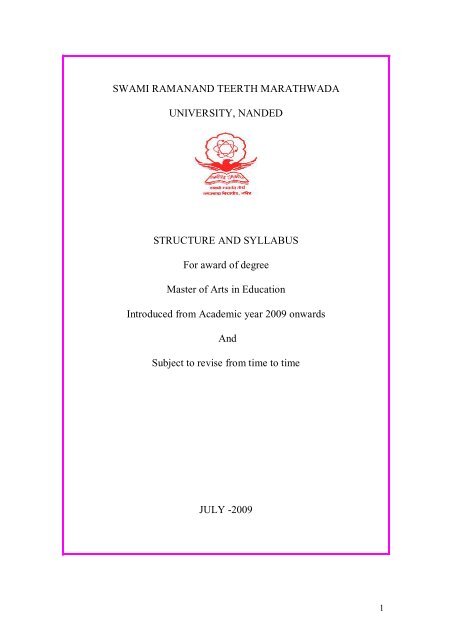
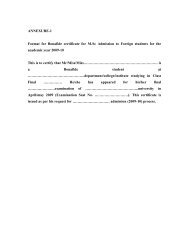

![Lokeh jkekuan rhFkZ ejkBokMk fo|kihB] ukan sM - - The Swami ...](https://img.yumpu.com/26553812/1/190x245/lokeh-jkekuan-rhfkz-ejkbokmk-fo-kihb-ukan-sm-the-swami-.jpg?quality=85)
